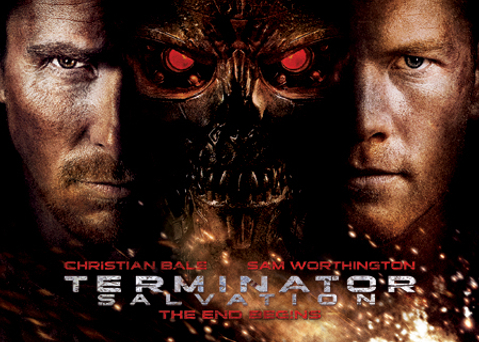
The fourth Terminator film is not exactly the train wreck it could have been and breaks down like this: the action is good, the drama average and the timeline utterly baffling.
For those who need a bit of a refresher on the famous franchise, Terminator Salvation actually takes place in the apocalyptic future glimpsed at in the first three films in which mankind has been enslaved by a giant computer network known as Skynet.
Up to this point robots from the future (known as Terminators) have been sent back to the present (or more accurately the years 1984, 1995 and 2004) in order to kill the future leader (John Connor) of the human resistance movement.
With this film the focus is on Connor (Christian Bale), a mysterious man named Marcus Wright (Sam Worthington) and the efforts to locate a young Kyle Reese (Anton Yelchin), who was the character who saved Connor’s mother in the first film.
The most surprising aspect of the script, written by a host of scribes including John D. Brancato, Michael Ferris, Jonathan Nolan, and Anthony E. Zuiker, is that it gives almost equal screen time to Worthington and Bale.
Without giving too much of the plot away it manages to play around with the idea of the Terminator characters in a way that you might not expect.
But although the key sub-plot works well, the dramatic scenes on the whole compare unfavorably to the earlier films.
This is where you wonder why McG was hired as a director. Although the action sequences are handled well, the underlying tension and human drama is wasted with too many characters shouting and grimacing their way through scenes.
Given that much of the strength of the first two Terminator films was their intense and imaginative mix of drama, action and special effects, who thought that the guy behind Charlie Angel’s: Full Throttle was the guy to direct this?
There are some set pieces that are handled with a degree of panache and skill but the scenes in between that don’t involve explosions are mostly flat and perfunctory.
But part of the problem with this film is that the timeline – the narrative rock upon which everything is based – is utterly confusing.
In this film John Connor is trying to save the man who will become his father (Kyle Reese), so he can send him back in time to 1984 in order to save his mother.
But the events of T2, T3 and the recent TV show leave me baffled. Empire have done an admirable job of deconstructing the timeline but even if you follow the ‘logic’ of all the intertwining threads you will either get a heavy discussion about the nature of time travel or a headache.
Buty you could argue that many other films involving time travel contain similar paradoxes if you scratch beneath thier surface.
James Cameron set a very high standard with the first two films and perhaps the lesson of the Terminator franchise is that things haven’t been the same since he left.
In Terminator 2, John Connor says:
The future’s not set. There’s no fate but what we make for ourselves.
Maybe it would have been better to let Cameron make that fate or just not revive it at all.
Terminator Salvation is out at UK cinenas now
> Official site
> Reviews of Terminator Salvation at Metacritic
> A whiteboard that ‘explains’ the Terminator timeline